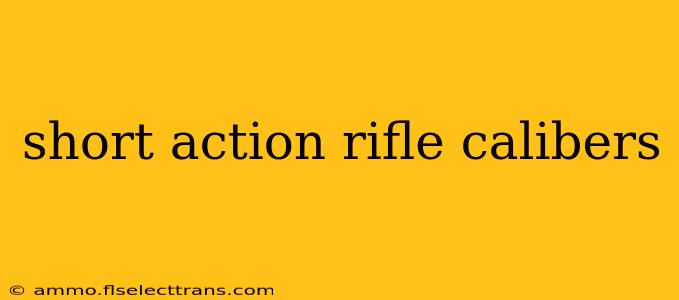Choosing the right caliber for your short-action rifle can significantly impact your shooting experience. This guide delves into the popular options, outlining their strengths and weaknesses to help you make an informed decision. Whether you're a seasoned hunter or a novice shooter, understanding the nuances of short-action calibers is crucial for optimal performance.
What Defines a "Short Action"?
Before we dive into specific calibers, let's clarify what constitutes a short action. A short action rifle refers to the size of the receiver, specifically designed for cartridges with shorter overall lengths. This generally translates to cartridges with less powerful, though not necessarily less effective, performance compared to those used in long-action rifles. The shorter action often leads to a more compact and lighter overall rifle design, making it more maneuverable in various hunting and shooting scenarios.
Popular Short Action Rifle Calibers: A Detailed Look
Several calibers excel in the short-action realm, each with its own unique characteristics. Let's explore some of the most popular choices:
1. .223 Remington / 5.56x45mm NATO:
- Strengths: Extremely popular, readily available ammunition, relatively inexpensive, low recoil, high velocity, suitable for varmints, and tactical applications.
- Weaknesses: Limited stopping power on larger game, potential for over penetration.
- Best Uses: Varmint hunting, target shooting, tactical applications, and self-defense (with appropriate training).
2. .300 Blackout:
- Strengths: Subsonic and supersonic ammunition options, good for suppressed shooting, decent stopping power for its size, relatively low recoil.
- Weaknesses: Can be more expensive than .223 Remington.
- Best Uses: Home defense, hunting hogs and deer at shorter ranges, suppressed shooting.
3. 6.5 Creedmoor:
- Strengths: Excellent accuracy, moderate recoil, flatter trajectory than many other short-action calibers, suitable for longer-range shooting, effective for deer-sized game.
- Weaknesses: Can be slightly more expensive than .223 Remington or .300 Blackout.
- Best Uses: Precision shooting, hunting deer and other medium-sized game at longer ranges.
4. .243 Winchester:
- Strengths: Versatile, accurate, moderate recoil, suitable for various game from varmints to deer.
- Weaknesses: Not as popular as .223 or .300 Blackout, which can impact ammunition availability in some areas.
- Best Uses: Varmint hunting, deer hunting, general-purpose hunting.
5. 7mm-08 Remington:
- Strengths: Flatter trajectory than .308 Winchester, excellent for deer and other medium-sized game, decent accuracy, moderate recoil.
- Weaknesses: Ammunition availability might be less widespread than more popular calibers.
- Best Uses: Hunting deer and other medium-sized game at moderate to long ranges.
Choosing the Right Caliber: Factors to Consider
Your choice of caliber should depend heavily on your intended use. Consider these factors:
- Intended Use: Hunting, target shooting, competition, self-defense?
- Game Size: What animals will you be hunting (if applicable)?
- Shooting Range: Will you be shooting at close or long ranges?
- Budget: Ammunition costs vary significantly between calibers.
- Recoil Sensitivity: Some calibers have more recoil than others.
Conclusion: Finding the Perfect Fit
Selecting the right short-action rifle caliber requires careful consideration of your individual needs and preferences. By understanding the strengths and weaknesses of each caliber, you can choose the one that best suits your shooting style and objectives. Remember to always prioritize safety and practice responsible gun handling. This guide provides a solid foundation, but further research and consultation with experienced shooters are highly recommended before making your final decision.

